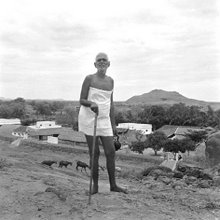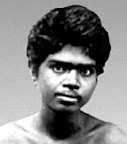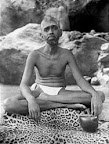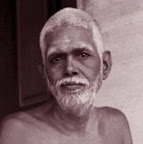A devotee once asked Bhagavan, "Swami, do you sleep?"
Bhagavan: Am I awake now? Devotee:
Yes, otherwise how can anyone speak?
Bhagavan: If one is awake it means he wakes up from sleep, isn't it?
Another doubt expressed was how could one who had transcended the three states experience deep sleep. The reply was, "It is the body that sleeps and wakes up. The I is always there as a witness."
Venkateswara Sarma once asked, "Bhagavan performs so many acts but says that he is doing nothing. How is this possible?"
Bhagavan: Even if told, can you understand? Think it over.
Bhagavan later continued, "Any action of one whose ahamkara has disappeared, is not because of his will. The action is perceived only by others."
In trying to understand the daily routine of Bhagavan the above observations have to be kept in mind. The purpose of this chapter is merely to describe what went on in the Presence, nothing else.
In the early days, when the Ashram was small, there was no activity in the Ashram in which Bhagavan did not
participate. During those days, Bhagavan would wake up around 2.30 or 3 in the early hours of the day and after ablutions would go to the kitchen to cut the vegetables as did his disciples. He would also prepare the breakfast and the side-dish to go with iddlis. Bhagavan always emphasized the dignity of labour and would also teach the art of cooking to disciples. He held that one not well-versed in cooking could not claim to be educated either!
Around 5 A.M. the doors of the hall would be opened and several devotees, about to leave for the various teerthas for bath or for giri pradakshina would walk in and prostrate before Bhagavan. Vedic scholars would recite from the Upanishads.
Some others would sit for meditation. Yet others would recite Muruganar's hymns. During Dhanurmasa (December-January) Andal's `Tiruppavai' would be sung. At about 5.30, students of the Vedic school would come and recite Sri Ramana Chatvarimsat and Taittiriya Upanishad . By that time, lady devotees who had spent the preceding night in the town (as their stay at the Ashram during night was forbidden) would arrive.
By 6.30, Bhagavan would go for his bath and later go to the dining hall, where he would be served breakfast. Thereafter, Bhagavan would go towards the hill and ashramites would go about attending to their duties. These duties were varied, like collecting flowers from the garden and stringing them into garlands or bringing various items from the storeroom and getting them ready for cooking, or getting down to cooking or attending to the cattle in
the goshala. Some went to work in the Ashram office or the library. For those in the Vedic schools the duty was to offer worship three times a day at the Matrubhuteswara shrine, and at the images of Skanda, Ganesa or at Bhagavan's picture. On special occasions, special poojas were also offered.
By about 8 o' clock, Bhagavan would return to the sofa. Thereafter, devotees, visitors and disciples would assemble there. Usually silent meditation would be carried on. But those who looked upon Bhagavan as God would not keep silent and they would either recite the stotras written by them, or just show him their poems. They would also sing songs. Yet others would narrate their domestic problems to him!
Some came to the Ashram to indulge in some argumentation and show off their erudition. On such occasions, Bhagavan would usually remain silent and would not speak unless a question was specifically addressed to him. A Theosophist once asked Bhagavan, "They say that Masters (great souls) exist in an invisible form, how is one to see them?"
Bhagavan: How can you see those who are invisible? Visitor:
By jnana.
Bhagavan: For a jnani [?] there is no `other.' An ashramite once said to Bhagavan: "You say that the world is an illusion, whereas we don't say so. Is this not the only difference between us?"
Bhagavan: Not at all. All that we say is that the only Truth is the Atma and that the world is only Atma. By
saying that the World, Self and Easwara are Truth you are apportioning only one-third of the truth to Easwara.
A Christian missionary once asked Bhagavan "Is Easwara a person?"
Bhagavan: Yes, he is the first person, `Aham.' If you give importance to the world he does not get even the second person but only the third person. According to the Bible, He told Moses, that his name was `I am' (Aham asmi ).
There were several occasions when people exceeded their limits in their talk with Bhagavan. Such behaviour was looked upon as a nuisance by those who came to Bhagavan's presence for meditation or self enquiry which were facilitated by his presence and some of them did feel the results straightaway. Yet why did aberrations occur? By the touch of Bhagavan's sakti the mind of some visitors got churned and their latent tendencies surfaced. These were imbued with the three gunas [?] and showed themselves as irreverent acts.
There were some who were busy with Bhagavan's literary works. Bhagavan would help them in their task. In the early years Bhagavan himself would write the fair copies or correct the proofs. He also would bind books.
Bhagavan's kindness was proverbial. His concern for the downtrodden was phenomenal. His kindness was directly proportionate to the misery of the visitor. Also, his welcoming smile to an infant was warmer than that to a learned scholar. Similarly, his replies to an unlettered person were more illuminating than those to a scholar. His warmth
towards a poor man was greater than that towards a rich one.
Old devotees and those who knew Bhagavan's nature hesitated to go to his presence but this was not the case with new visitors. They went straight to Bhagavan who welcomed them with a smile.
People were forbidden from touching Bhagavan. No such restriction applied to squirrels or doves which sat on his lap. Cows and dogs would be patted by Bhagavan. He would show greater interest in receiving the books, toys or peppermints brought by children than in receiving scholarly works by erudite scholars.
By nine o'clock, Mouni would bring the day's post.
Bhagavan would have a look at the letters for about one hour and thereafter till eleven o'clock it was the same routine. By eleven Bhagavan would rise for lunch and till about two o'clock in the afternoon visitors did not disturb him. During this interval Bhagavan would glance through the newspapers or take some rest.
Thereafter, the hall would get filled up as usual. This was the time when philanthropists and poets would talk, bhaktas would sing and scholars would begin philosophic discussions. This was also the time when Bhagavan would be absolutely silent. When asked how this was possible he would say, "If you pay attention only to the base note and not to the other notes can the mind become engrossed in the raga?" He also would say, "If you pay attention to the Self other objects will not attract you."
Thereafter, he would attend to correspondence.
Mouni would keep the replies for letters received ready
and show them to him. Bhagavan would go through them and make corrections wherever deemed necessary.
At about 4.30 p.m. Bhagavan would go out for a walk on Arunachala.
By 5.30 p.m. meditation would commence. It was a moment eagerly looked forward to by disciples. Peace would reign all around. As darkness fell and enveloped Arunachala it would appear as if life itself was being enveloped by ignorance. A little later students of the Vedic school would arrive and recite Rudram, Purusha-sooktam, Srisooktam and Upadesa-saram. Those sonorous notes would touch the foot of the hill. After a silent half an hour, recitation of various writings of Bhagavan would commence. By then the pooja at Matrubhuteswara shrine would be over. Thereafter women would have supper and go out of the Ashram into the town for the night.
After the night meal by about 8.30 p.m., disciples would gather round Bhagavan. It was a time when everyone was relaxed in Bhagavan's presence. After some time, everyone would depart after pranams to Bhagavan. The doors of the hall would then be closed. This was the usual daily routine.
Three days in a year were special. Thousands of visitors thronged the Ashram and all of them would be fed — these three were Krittikai, Ramana's birthday and the Mahapooja day at Matrubhuteswara shrine. Krittikai has already been alluded to. Ramana's jayanti (birthday) would fall the day after Ardra darshan. Celebration of jayanti was begun by Gambhiram Seshayya in 1912
when Bhagavan was residing at the Virupaksha cave. Bhagavan did not approve of the proposal and wrote two Tamil verses on the occasion.
1. You who wish to celebrate a birthday, first inquire who was born. One's true birthday is when one enters into the Eternal Being which shines forever without birth or death.
2. Of all days, on one's birthday one should mourn one's fall (into Samsara). To celebrate it as a festival is like adorning and glorifying a corpse. To seek one's Self and merge in it is wisdom.
Translation: Collected works But the disciples insisted that the celebration was for their own benefit and was necessary as a mark of their gratitude for Bhagavan's arrival in their midst for their uplift. On their persistence Bhagavan let them have their way. Ever since, Bhagavan's birthday (jayanti) is being celebrated with great enthusiasm to this day.
The celebrations, during Bhagavan's time would be on the following lines.
The hall opposite the Matrubhuteswara shrine would be decorated and while the pooja at the shrine commenced Bhagavan would arrive and sit on a couch. Nadaswaram and other musical instruments would be played and aarti offered to Bhagavan. Devotees would thereafter prostrate themselves in front of Bhagavan. Around eleven o'clock, poor feeding and a feast for devotees would take place. The poor feeding would go on till about three o'clock in the afternoon. Feeding of
the poor was especially pleasing to the mother enshrined as the Matrubhuteswara.
The other important celebration at the Ashram was the Mahapooja to commemorate the samadhi of the mother.
Whatever was done at the Ashram was done as an offering to the Lord who purified the mind and granted liberation. Ashramites also believed that all actions should be desireless and that deeds were more important than words. Just as hunger would not be appeased by merely shouting for `food' even so, in the philosophy. All that was required was unquestioning sadhana [?] and everything would come to fruition in the fullness of time — there were no milestones in this philosophic quest. Thus desireless action and constant practice would render daily life sacred and pure.
Bhagavan used to go around the Ashram while all inmates were asleep. Perhaps the father wished to protect his children while they were all asleep also!
Referred Resources:
Links to letters:
three states: (Chapter 137: Beyond the Three States
birthday: (Chapter 97: Birth
pradakshina: (Chapter 41: The True Nature of Pradakshina
Links to rl:
Muruganar: (Chapter 34: Followers
Virupaksha: (Chapter 18: The Peerless Hill
Gambhiram: (Chapter 19: Commencement of Instructions
Links to sp:
Links to gems:





No comments:
Post a Comment